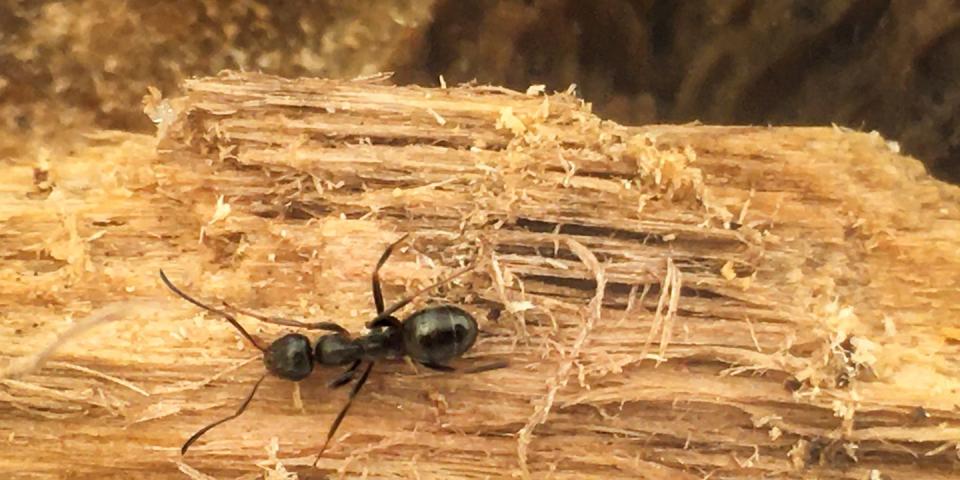How to Get Rid of Carpenter Ants Before the Damage Is Done

Though there are over 12,000 known species of ants, you can ultimately divide them into two categories: annoying but harmless and seriously destructive. In the warmer months, your indoor and outdoor spaces can end up hosting critters in both categories, and you may be desperate to find out how to get rid of ants. There are the impromptu cities of tiny pavement ants that pop up on your paths, driveway, and sidewalk (harmless but the opposite of curb appeal).
There are also the little black sugar ants that magically make their way into your home to find that one minuscule crumb you dropped on the floor (relatively harmless, though they can carry bacteria). Then, there are the large carpenter ants who have picked up the summer job of destroying your home from the inside out. Not good—and they also bite. If you're wondering how to get rid of carpenter ants, here's everything you need to know.
What are carpenter ants?
Carpenter ants have gotten their name because of the way they damage the wood that makes up your home and furniture. While they don't consume wood the way termites do, they chew and excrete it in order to make pathways for themselves and their thousands of friends and family. If you start seeing random piles of particles that look like wood shavings, that's a sign you have carpenter ants. (Fun fact: Insect experts call that stuff "frass.")
You can identify a carpenter ant from other types by their size. They are big: About 1/2" to 5/8". Carpenter ants also are usually red-black, or all-red, all-black, or all-brown.
How do carpenter ants get inside a home?
Carpenter ants love wet and/or moldy wood, so if there is a moisture issue in any part of your home, they'll be attracted to those areas. However, carpenter ants don't always get into your home by chewing their way through wood. They can enter your home through any crack or tiny opening, even if it is high above the ground (carpenter ants will simply use a branch or climb up pipes and wires to get there).
Indoors, carpenter ants usually like to set up their homes near water sources. The areas near air-conditioning units, dishwashers, sinks, and bathtubs are all popular places for carpenter ants.
How do I get rid of carpenter ants?
It's not as easy as killing any ant you happen to see. Like all ants, carpenter ant colonies start with scout ants that forage your home for the best places to eat or hang out. Then, their buddies (the "workers") follow the trail once they've hit a good food source, building a nest nearby in your wall. If you've spotted a few stray carpenters, congrats, you've probably found these little explorers. Here's what to do next:
Make a bait to find the nest. Pest experts advise setting out a bait for the ant to take back to the nest, so you can actually find the nest just by watching them. They're attracted to sweets, so a little bit of jam or jelly can work. You can also mix equal parts sugar and baking soda, then place the mixture in a shallow dish. The sugar attracts the ants, but the baking soda will kill them naturally.
Eliminate scent trails. Carpenter ants rely on pheromone trails to find food sources and to travel. By cleaning surfaces where ants have traveled, you've destroyed this treasure map to your home. You can use essential oils like tea tree, lemon, orange, or cedarwood on a cotton ball to wipe down surfaces to interrupt these trails. Or, make a solution of one part dish soap to two parts water and pour into a spray bottle. (You can also use this to kill ants, after you've found their nest.) You could also use a 50/50 solution of white vinegar and water.
Destroy the nest. Once you've found the nest by following ants, by spotting "frass" near a wall, or can detect a faint rustling sound in the wall, you'll need to get into the wall to destroy it. Terminix recommends drilling 1/8" holes every six inches in the area where you suspect the nest might be. Then, use a bulb duster to "puff" boric acid through the holes. (The boric acid will kill the ants.) You might have to repeat treatments multiple times in order to destroy the nest.
When do I need to call in a pro to deal with the carpenter ants?
If this sounds like more work or more of a mess than you're willing to make, then call in a professional. Even if you successfully get rid of the carpenter ant nest, there still might be more in your home. Call an exterminator to check that the nest is destroyed and to look for possible other nests. You should also call a pro if you haven't been able to find the nest, but still see carpenter ants.
You Might Also Like

